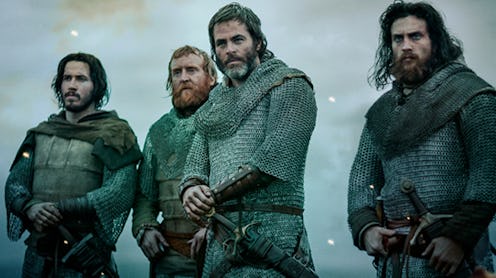Entertainment
Chris Pine’s New Netflix Movie Will Turn You Into A Scottish History Buff
Whoever claimed those who don't learn history are doomed to repeat itself must never have been film fans. Despite millennia of human drama and events, big-screen historical adaptations tend to trot out the same few figures and events again and again (I'm pretty sure Queen Elizabeth's entire life's been covered onscreen at this point), so it's refreshing to see a lesser-known historical figure get their moment in the sun. Streaming Nov. 9, the Netflix original Outlaw King is a true story of famed Scottish national hero Robert the Bruce, who moviegoers might remember only from a brief (and comparatively historically incorrect) appearance in Braveheart.
Born into a noble family (his name came from his grandfather, Robert de Brus, 5th Lord of Annandale, and was likely a convenient way to distinguish him from the many other Roberts of the time), he fought against both Edward I and II of England, eventually helping establish Scotland as an independent power. The Guardian's thorough interactive history on his full reign explains that Robert the Bruce spent all but the last year of his rule at war, dealing with the internal conflict he set off by killing his main rival John Comyn (in front of a church alter no less), and battling the kings of England. With 1328's signing of the Treaty of Edinburgh-Northampton, he finally had England recognize his kingship, and peace prevailed.
While he's a famous figure in Scotland, he's little known to most Americans (unless they've serious Scottish Pride), so it's nice that Netflix picked a particularly dynamic and young ruler to follow.
In Outlaw King, Chris Pine plays the 14th-century warrior at a particularly tumultuous point in his, and his country's, life. The young successor to the Scottish throne had killed his main rival and claimed the crown, but faced a vicious English army headed by Edward I. After a defeat at the battle of Methven, Robert fled with a few loyal warriors, leaving behind his queen and court. The film follows him from around 1298 to 1306 as he gathers a small army to fight the English using guerilla warfare, a tactic which as the BBC points out in its history on Scotland, the real-life Bruce used.
For those who think a 700-year-old story doesn't have any message for the modern day, Chris Pine explained what drew him to the film in a TIFF interview. "What turned me on about this story was... how this man who comes from great wealth and power decides at a very difficult time to give up all of that, all of that safety, for that uncomfortable, unsafe environment where he puts his family and friends at risk. And in that capacity he is able to do something great for many people." Tying that plot into the current state of affairs, where society seems to suggest relying on and praising the ultra-wealthy is the only way to 'fix' societal problems, Pine sums Outlaw King up in the grand tradition of hero tales: "There is hope in the possibility of doing selfless acts."
There's a bit of poetic license to that interpretation, as what Robert the Bruce eventually accomplished was a united and independent Scotland, not exactly a completely selfless act as it put him on the throne to rule over the land (which, admittedly he had a claim to via ancestry and battle). But it did set the country on course to its present day incarnation, a fact the BBC's account of Bruce's turning-point victory acknowledges by opening with the line "If there is a fact every Scot knows, it is who won the Battle of Bannockburn in 1314."
Warfare of the era was brutal, and Outlaw King doesn't stint on the violence, or shy away from depicting the punishments awaiting at enemy hands. Though it takes the usual Hollywood liberties, the film is a good primer for those who've never heard of Robert the Bruce before, and a new slice of history for those who want to dive in.
